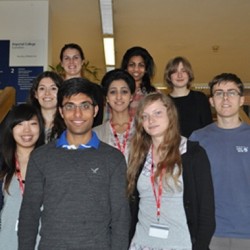By Helen Figueira
November 3, 2011
Time to read: 3 minutes
 Report and Audio interview
Report and Audio interview
Every year during the summer, research groups at the CSC host some of the brightest A-level and undergraduate students eager for a taste of life in the lab.
Funded by the charitable Nuffield Foundation, the two month placement allows students the chance to participate in projects as diverse as investigating neuron repair in the brain, challenging preconceptions about the relationship between diet and obesity, exploring pharmaceutical candidates for the treatment of septic shock, and making biological sensors for imaging applications.
Report and Audio interview
Every year during the summer, research groups at the CSC host some of the brightest A-level and undergraduate students eager for a taste of life in the lab.
Funded by the charitable Nuffield Foundation, the two month placement allows students the chance to participate in projects as diverse as investigating neuron repair in the brain, challenging preconceptions about the relationship between diet and obesity, exploring pharmaceutical candidates for the treatment of septic shock, and making biological sensors for imaging applications.
On Friday 26 August the students had the opportunity to present their work to their peers on the scheme, as well as other scientists based at the CSC and Imperial College. Among other revelations, the audience found out that it is possible to track the flow of energy within cells and that your mother’s diet and levels of body fat when she is pregnant with you can have a drastic impact on your own weight throughout your life.
Shadman Aziz, an A-level student at City and Islington Sixth Form College, explained that his project with the Metabolic and Molecular imaging group appeared to show that so-called ‘yo-yo dieting’, where individuals oscillate between having high and low levels of body fat, was not harmful to health, contradicting preconceptions that even many health professional hold. As opposed to science in school, “where you’re learning things that have already been developed by previous scientists,” explains Shadman, “in a lab in the CSC for example, we’re developing new ideas; we’re discovering and researching for ourselves…that’s the main difference.”
Jade Fernandes, an undergraduate student studying at Imperial College also thought that the unpredictability of research was one of its most defining and exciting aspects: “When you do real research you don’t know what the result is going to be, and often it isn’t what you expect, so you have to find a reason why it’s happened like that…It’s been a great experience.”
“I’d definitely recommend this to anyone who has an interest in science and who wants to see what science is all about,” said James Wilkinson, an A-level student who also worked in the Metabolic and Molecular Imaging group, investigating how epigenetic factors can influence obesity. “My aspirations are in medicine, [and] I would be hugely interested in pursuing research in medicine in the future.”
The quality of the students and the quality of the research they presented was impressively high. “It was great to work with young students who were so engaged with their projects,” affirms Dr Alex Sardini, who hosted the afternoon session of presentations, “ – and see that they could give us a run for our money.”
If you’re interested in taking part in our summer student programme, please contact Kate Baird, Student Administrator.
SJ